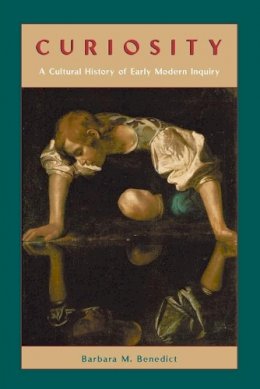22%OFF

Stock image for illustration purposes only - book cover, edition or condition may vary.
Curiosity
Barbara M Benedict
€ 47.99
€ 37.57
FREE Delivery in Ireland
Description for Curiosity
Paperback. Barbara M. Benedict draws on the texts of the early modern period to discover the era's attitudes toward curiosity, a trait which was often depicted as an unsavoury form of transgression or cultural ambition. Num Pages: 296 pages, 20 halftones. BIC Classification: 1D; 2AB; 3J; DSB; GTB; JFCX. Category: (G) General (US: Trade); (P) Professional & Vocational; (UP) Postgraduate, Research & Scholarly; (UU) Undergraduate. Dimension: 229 x 148 x 18. Weight in Grams: 452.
"Pithy and wide-ranging. . . . This study provides a fresh new lens through which to reinvestigate the whole of early modern English literature."—Library Journal
In this striking social history, Barbara M. Benedict draws on the texts of the early modern period to discover the era's attitudes toward curiosity, a trait we learn was often depicted as an unsavory form of transgression or cultural ambition.
"Pithy and wide-ranging. . . . This study provides a fresh new lens through which to reinvestigate the whole of early modern English literature."—Library Journal
In this striking social history, Barbara M. Benedict draws on the texts of the early modern period to discover the era's attitudes toward curiosity, a trait we learn was often depicted as an unsavory form of transgression or cultural ambition.
Product Details
Format
Paperback
Publication date
2002
Publisher
The University of Chicago Press United States
Number of pages
296
Condition
New
Number of Pages
296
Place of Publication
, United States
ISBN
9780226042640
SKU
V9780226042640
Shipping Time
Usually ships in 7 to 11 working days
Ref
99-50
About Barbara M Benedict
Barbara M. Benedict is professor in and chair of the English department at Trinity College, Connecticut. She is the author of Making the Modern Reader and Framing Feeling.
Reviews for Curiosity
"Robinson Crusoe told us that his head was always filled 'with rembling Thoughts.' That is how he got into such trouble, but it is also the way he survived. Rambling thoughts, as Benedict shows in this exuberant study, were at the center of English literary and cultural experience from the late seventeenth to the early nineteenth centuries. Transgressive, uncontrollable, hopelessly ... Read more
.png)